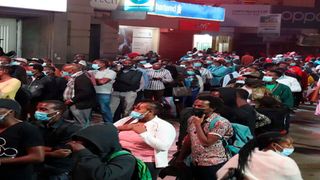
Nairobians crowd at a bus stop on Moi Avenue a few minutes to the curfew on April 12, 2021.
| Dennis Onsongo | Nation Media GroupNews
Premium
There is hope for reopening, but only if infections reduce
What you need to know:
- The Covid-19 curve has been flattening over the past 14 days.
- Education CS George Magoha is hopeful schools will resume for third term early next month as scheduled.
The rate of Covid-19 infections in the next 14 days will determine whether President Kenyatta will ease the lockdown in five counties, a top Health ministry official has said, giving hope to businesses that have suffered huge losses in the past month.
The acting Director-General for Health, Dr Patrick Amoth, said in an interview yesterday that the government is closely monitoring the infections curve, which has taken a downward trend following closure of bars, restaurants and churches and banned movement in and out five most infected counties, including Nairobi.
The positivity rate has been reducing for the past 14 days, an indication that the lockdown measures have helped slow down transmission of the virus.
“Our curve is behaving well,” Dr Amoth told the Nation yesterday.
From highs of 2,008 cases on March 26 and a daily average of 1,354 cases on March 30, to the 486 cases recorded yesterday and a daily average of 955, the infections have declined.
“If it continues this way in the next 14 days, we will advise the President accordingly,” he said.
Safety restrictions
Over week, Kenya has recorded 6,708 new Covid-19 cases and 124 deaths, according to the latest Ministry of Health data.
On a seven-day average, the number of admitted patients has been 1,616, of which 238 have been under intensive care and 16 in the high dependency unit.
This is compared to the 8,332 cases recorded the previous week, which also recorded the highest daily average of 1,354 cases, and perhaps one of the darkest weeks a year since the pandemic hit the country. The week also saw 109 deaths recorded from the disease.
On Sunday, the positivity rate stood at 15 per cent (seven-day average) from a 22 per cent high in late March.
The World Health Organization recommends that the positivity rate should go below five per cent for two weeks for Covid-19 safety restrictions to be lifted.
Curfew hours
On March 26, the government reimposed lockdown measures in Nairobi, Machakos, Kiambu, Kajiado and Nakuru counties. Curfew hours were also increased and bars closed, besides a nationwide ban on public gatherings.
The measures invited strong criticism, especially from churches and the hospitality industry, with entertainers and hotel, restaurant and bar owners citing a negative impact on their businesses and their staff.
They asked to the government to review the measures, and be told when the rules will be relaxed. They also sought tax waivers or reductions.
“We’re heavily relying on [government] support to reduce the level of strain felt by the sector players,” said Pubs, Entertainment and Restaurants Association of Kenya Director Michael Muthami on Friday.
Bars and restaurants are operating at 30 per cent capacity and only for take-away and deliveries.
“We’re willing to take the Covid-19 vaccination and the government should consider prioritising the hotel employees,” he said.





